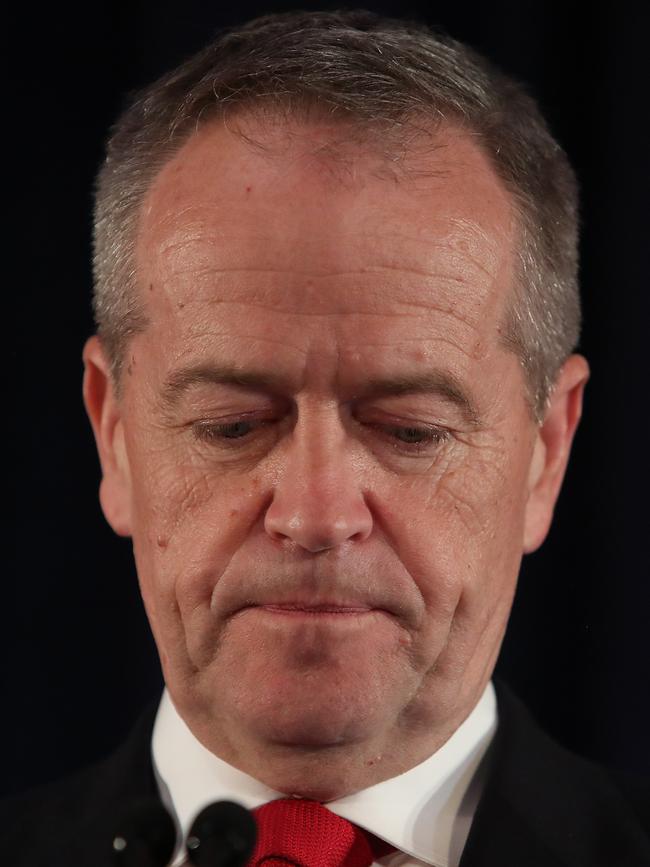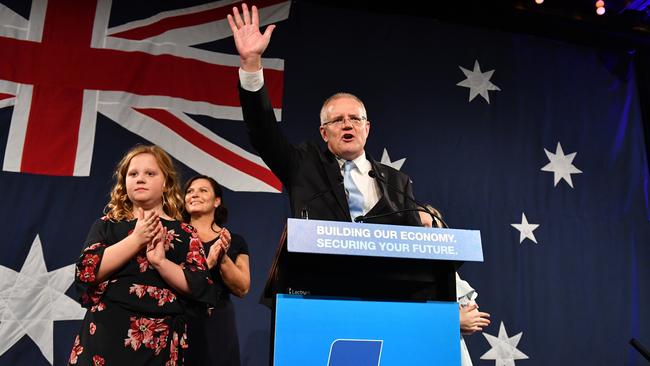Labor review blames Shorten, strategy for failed campaign
Labor has identified eight key reasons for its election debacle, and the blame starts at the top. The review into its shock loss points the finger at an unpopular leader.

News
Don't miss out on the headlines from News . Followed categories will be added to My News.
The of Bill Shorten have hit out at the party’s campaign review for naming him as a major reason for the election loss, while not recommending junking individual policies such as franking credits.
Labor’s review declared the former Opposition leader’s unpopularity “contributed to the election loss”, saying he took an overly ambitious policy agenda that made the party look “risky”.
The report, completed by former Cabinet minister Craig Emerson and ex-South Australian premier Jay Weatherill, also savaged the party for not shifting tactics when Scott Morrison took over from Malcolm Turnbull.
Labor lost the election because of a “weak strategy that could not adapt to the change in Liberal leadership, a cluttered policy agenda that looked risky and an unpopular leader”.
The review said policies such as negative gearing and franking credits opened the party up to attacks by the government over the “sheer volume of spending announcements”.

But it stopped short of recommending particular policies be scrapped and even pointed out voters most likely to be affected by the policy to scrap cash refunds for franking credits swung to Labor.
Mr Shorten on Thursday conceded he should have “gone bigger” with personal tax cuts for millions of workers and taken “a different position on franking credits”.
One Labor Right MP said they were disappointed Mr Shorten’s unpopularity was named as a major reason for the loss, but there was no conclusion on particular policies, such as franking credits.
“It says our policy agenda was too broad, but doesn’t recommend which policies to scrap,” the MP said.
Another MP complained the review identified problems with connecting with suburban and regional voters, but didn’t outline how to fix it.
“It doesn’t fully grapple with the significant problems we have in reaching people in suburban and regional areas,” the MP said.
Other Labor MPs said the review handled the issue of Mr Shorten’s leadership delicately, praising him for his unified approach but not ignoring his unpopularity.
“It couldn’t be ignored,” an MP from the party’s Left faction said.
The review found Mr Shorten performed “solidly during the campaign, including bettering his rival in three debates”, despite “some early slips”.
It also found mining magnate Clive Palmer’s big-spending campaign had “significant negative effect on Bill Shorten’s popularity and on Labor’s primary vote”.

The review said the size and complexity of Labor’s spending commitments — which totalled more than $100 billion — exposed the party to a Coalition attack that “fuelled anxieties among insecure, low-income couples in outer-urban and regional Australia that Labor would crash the economy and risk their jobs”.
Labor’s online strategy was slammed for “going backwards”, and it was not “effective in countering disinformation on digital platforms of its political rivals”.
The party’s structures for making decisions were also criticised, with the review pointing out there was no formal campaign committee, which meant there was “no forum for formulating an effective strategy”.
Labor’s ambiguous language on the controversial Adani coal mine “devastated its support in coal mining communities”.
The review said the party’s class war rhetoric, including references to “the big end of town”, was overly divisive.
Labor performed best in Victoria, but did not receive enough votes in the Liberal-held seats of Kooyong, Higgins, and Goldstein.
At the same time, a swing by Chinese Australian voters against Labor of more than 2 per cent nationally helped deliver the Melbourne seat of Chisholm to the Coalition.
Labor leader Anthony Albanese will give his response to the review today at the National Press Club in Canberra.
HOW SHORTEN WOULD CHANGE CALAMITOUS CAMPAIGN
Bill Shorten has accepted responsibility for the tax and spend policies he took to the election as Labor prepares to release its long-awaited review into the campaign.
The former Labor leader said the party must “learn the lessons of defeat”.
“There are many players on a team but as captain of that team I accept responsibility for the policies taken to the election,” Mr Shorten said.
“And while the review has not considered or reviewed the merit of those policies it is important that the party does.”
According to Mr Shorten, the review takes into account the “relentless and unprecedented multimillion-dollar political attacks on me” by Clive Palmer and the Liberals which “successfully tarnished my public standing”.
“The May result was a shock and a surprise but it was not a landslide and if Mr Morrison continues to disappoint Labor is in swinging distance of forming Government,” he said.
“Were the universe to grant re-runs, I would campaign with fewer messages, more greatly emphasise the jobs opportunities in renewable energies, and take a different position on franking credits.”
MORE NEWS
HUGE RATS CAUSING HAVOC AT SOUTHLAND
10 REASONS LABOR LOST THE ELECTION
1. Too many policies that competed against each other and “added to perceptions of a risky program”
2. Bill Shorten’s unpopularity “contributed to the election loss”
3. Labor failed to carefully analyse the change of Liberal leadership under Scott Morrison
4. Big expectations of a Labor victory hurt their performance
5. Tax and spending policies exposed Labor to Coalition attacks on the economy and Budget
6. Politics of envy and attacks on “the big end of town” “amplified perceptions Labor was a risk to the economy and jobs”
7. Queenslanders felt “Federal Labor was not on their side”
8. Lack of a strategy without a formal campaign committee
9. Bad polling that “consistently” over-estimated Labor’s vote
10. Clive Palmer’s campaign had a “significant negative effect on Shorten’s popularity and on Labor’s primary vote”
